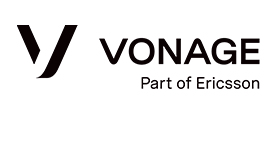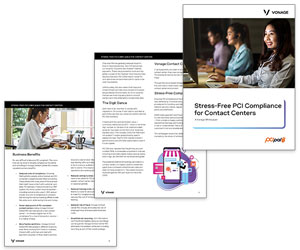Vonage explores what 5G means for business, its benefits and challenges, and its applications in various industries.
According to Precedence Research, the global 5G enterprise market size accounted for $4.92 billion in 2024 and is predicted to surpass $82.67 billion by 2034. With its high speeds and reliable connections, it’s not surprising that more and more people are harnessing 5G for business.
In addition to boosting efficiency and facilitating remote work, it supports automation, AI, and virtual reality. Ready to achieve the speed and connectivity of the future?
What is 5G?
5G is the fifth generation of wireless technology. It builds on the capabilities of its predecessors (3G and 4G) to deliver improved speed, reliability, and connectivity.
Where 3G was all about voice and data, and 4G enabled faster mobile internet and video streaming, the 5G upgrade goes a stage further.
5G was developed to cope with increased demand from mobile internet users (almost 96 percent of the global digital population in 2023, according to Statista).
It offers faster data transfer, higher bandwidth, lower latency, and the ability to support many more connected devices.
5G can operate across various frequencies, including low-, mid-, and high-band. Millimeter-wave (20-60 GHz) is the highest frequency, which gives the fastest speeds but isn’t available everywhere. At the lowest end of the spectrum is sub-6 GHz, which is more widely available but offers slower speeds.
Why do Enterprises Need to Adopt 5G? A Summary of Business Benefits
Enterprises are adopting 5G to unlock faster speeds, greater connectivity, and improved operational agility across departments.
Compared to previous generations, 5G for business offers high-speed data transmission, ultra-low latency, and vast device capacity, powering digital transformation and productivity gains.
Key Benefits of 5G in Business:
1. Next-Level Connectivity:
- Faster speeds: Up to 20 Gbps peak rates enable near-instant downloads and high-bandwidth content delivery
- Lower latency: Response times under 1 ms support real-time communications and critical systems
- More capacity: 5G can support millions of IoT connections in dense environments
2. Operational Efficiency:
- Remote work enablement: Seamless, reliable connectivity supports hybrid and distributed teams
- Smart automation: 5G supports smart factories, autonomous systems, and predictive maintenance
- Real-time insights: Ability to collect and process operational data in the moment for faster decisions
3. Customer Experience Innovation:
- Personalization: Real-time data powers targeted marketing and dynamic customer support
- Immersive AR/VR: Chance to enhance training, demos, and shopping with interactive virtual experiences
- Faster payments: Customers can enjoy speedy and secure transactions
4. Cost Optimization & Revenue Growth:
- Lower infrastructure costs: Ideal time to replace legacy MPLS with cost-efficient wireless architecture
- New revenue models: Companies can enable products and services built on connected devices or digital platforms
5. Advanced security:
- Encrypted communications: Enhanced security protocols protect sensitive enterprise data
- Network slicing: Isolated network segments improve performance and reduce risk
In short, 5G business internet empowers companies to reduce costs, create new value, and scale with confidence. By leveraging 5G’s speed and flexibility, businesses can lead in a connected, data-driven economy.
Benefits of 5G For Business
Whether you’re in retail, manufacturing, or healthcare, 5G opens up a world of possibilities for organizations of all sizes. Here are just some of the positive 5G implications for business.
Speed and Efficiency
5G is super-fast, potentially up to 10 times faster than 4G. This enables you to almost instantly transfer large amounts of data and carry a much higher volume over the same bandwidth. It’s especially suitable for businesses with high data demands.
Increased speed leads to improved user experiences and overall business efficiency. For instance, productivity, and therefore operational costs, will improve because you don’t have to wait ages for large files to download or access cloud data.
Reliable Connections
5G gives you highly reliable and stable connectivity with low latency, often below 1 millisecond (latency represents the time between sending and receiving data). This is ideal for real-time applications like video conferencing, with less risk of dropped connections.
You don’t have to worry about losing contact during an important online meeting or a VoIP call, while instant messaging is more efficient.
5G also boosts performance for interactive customer service tools. This reliability makes your communications consistent and professional.
Remote Work From Anywhere
5G ensures that your remote and hybrid employees can work effectively from wherever they happen to be, getting the same level of connectivity as office-based staff. They can connect to the internet wirelessly and enjoy high-speed business internet access on their mobile devices.
This makes it easier for workers to stay connected to colleagues and customers and for your business to offer flexible working practices to attract and retain talent. You can also recruit globally and set up a network of connected offices worldwide.
Support For Multiple Devices and IoT
5G can support multiple connected devices per square mile, which is useful when employees are accessing the internet via computers, laptops, tablets, and cell phones all at the same time. Even if your business is in a densely populated area, you shouldn’t get any lag.
Meanwhile, 5G’s integration with IoT (Internet of Things) means you can run smart offices with connected devices and sensors to automate tasks, monitor systems, and collect data.
Flexibility and Customization
For enterprises looking to modernize and scale operations, one of the most compelling benefits of 5G for business is the ability to deploy private 5G networks.
These dedicated infrastructures use an enterprise-assigned spectrum and offer full control over performance, reliability, and security, far beyond what public cellular networks allow.
5G gives businesses plenty of configuration options with secure individual frequency bands for private networks. It also enables “network slicing,” which allows you to set up multiple virtual networks within one physical 5G network.
Each “slice” functions as an isolated end-to-end network, meaning you can separate different parts of your operations, such as keeping priority data separate from other network traffic.
Private 5G business internet empowers companies to:
- Guarantee bandwidth and ultra-low latency for mission-critical applications
- Maintain high levels of security and data sovereignty
- Segment and prioritize traffic across departments with network slicing
- Ensure reliability in remote or interference-prone environments
Industries like logistics, manufacturing, healthcare, and energy are leveraging private 5G to support connected machinery, automated guided vehicles (AGVs), and on-premises IoT deployments.
This level of control is why enterprises need 5G, it delivers the infrastructure backbone for digital transformation and automation at scale.
Advanced Analytics
Thanks to its high speeds, 5G helps businesses collect more data (including real-time data) about operational performance and customer preferences.
This enhances data processing capabilities and makes leveraging AI and machine learning easier for predictive analytics, data-driven decisions, and personalization.
Edge Computing
Another key reason why enterprises need 5G is its ability to support edge computing, moving data processing closer to the source of data generation.
Rather than sending data back and forth to centralized cloud servers, 5G enables businesses to analyze and act on data instantly at the edge of the network.
This reduces latency and enhances responsiveness, which is crucial for:
- Autonomous robotics and connected vehicles
- Real-time fraud detection in financial services
- Remote diagnostics in healthcare
- Smart infrastructure and predictive maintenance in manufacturing
With 5G business internet plans that include edge capability, enterprises can unlock powerful use cases while reducing cloud traffic and ensuring more secure localized data handling.
Improved Customer Experience
With 5G, you’ll be able to exceed customer expectations. It ensures glitch-free video and voice calling for customer support and supports virtual reality (VR) and augmented reality (AR), enabling you to offer immersive experiences.
This has applications for ecommerce, in-store retail, marketing, and enhanced training for your customer-facing teams.
Future-Proofing
The future of 5G looks set to bring developments such as connected buildings, more efficient energy grids, and greater integration with technologies like AI, IoT, and edge computing. By embracing 5G now, businesses can jump ahead of their rivals and remain competitive as the tech matures.
5G ROI: Economic Impact and Business Growth
Beyond speed and connectivity, 5G adoption offers significant economic advantages for enterprises and the broader market.
According to Deloitte, 5G-powered solutions are expected to generate over $1.3 trillion in global economic output by 2030, thanks to gains in automation, connectivity, and productivity.
For individual businesses, benefits include:
- Operational cost savings through cloud-native infrastructure
- Increased efficiency via automation, mobile workforces, and real-time data access
- Faster innovation cycles by enabling new services and customer experiences
- Better employee retention due to improved hybrid and remote work tools
Investing in 5G today helps businesses future-proof operations and stay competitive in fast-moving markets.
Is 5G For Small Business Use Cases Still Good Value?
It might seem as though the futuristic world of 5G is restricted to large enterprises, but that’s not the case. The technology is perfectly placed to support smaller businesses, especially given the potential cost savings it brings.
These savings are realized through increased efficiency and productivity, enabling you to do more with fewer resources.
5G also replaces expensive wired cables with cellular 5G business routers and improves battery life for your devices because they don’t require as much computing power.
Because 5G facilitates remote work, a small company can reduce costs by downsizing its office premises or even operating the whole business remotely. Kiosks, food trucks, and pop-up shops will always have connectivity for POS systems and contactless payments.
A faster network with higher bandwidth means small businesses can access technologies like automation, AR, and VR. This helps them stay competitive and prepare for future growth and increased data and communications volumes.
With improved experiences for employees and customers, 5G helps to boost retention and reduce acquisition costs. Yes, it requires some investment, but the benefits ensure you get value for money.
The Challenges of 5G For Businesses
While 5G internet for business is advantageous in most cases, like any new technology, it does come with a few potential drawbacks:
Cost
To implement 5G in your business, you’ll likely need to upgrade your existing infrastructure and hardware, which can be a significant investment (as well as time-consuming).
For example, you may need new antennas and base stations and potentially update or replace devices and applications to support 5G.
Availability
5G is still a new technology. Although 5G coverage has grown hugely, especially in the U.S., it’s still not universally available.
There’s a disparity between urban and rural areas because devices using the highest-band frequency (millimeter-wave or mmWave) must be very close to a 5G node to get a signal. The low-band sub-6Hz spectrum allows wider coverage but slower speeds.
Security
With more connected devices, cloud-based services, and real-time communication channels, security is a top concern in 5G for business environments.
5G networks have a wider “attack surface” due to the increased number of connected devices and IoT integrations. Fortunately, 5G networks incorporate advanced protections by design, but IT teams still need to act proactively.
Key security enhancements with 5G include:
- End-to-end encryption for secure voice, video, and data streams
- Zero Trust Network Access (ZTNA) and software-defined perimeters
- Network segmentation to isolate IoT traffic, guest access, or business-critical operations
- Device-level attestation and identity management to detect rogue devices
- Verification
For regulated industries, 5G also supports compliance with GDPR, HIPAA, SOC 2, and ISO 27001, helping reduce risk and protect sensitive customer and enterprise data.
Compliance
As 5G develops globally, we expect to see different countries and industries introduce regulations and standards for the technology.
Currently, the Federal Communications Commission has no 5G-specific rules but is modernizing outdated regulations to factor it in. Businesses need to stay aware of changes to remain compliant.
What Does 5G Mean For Business? Industry Examples
Another major driver of 5G for business growth is its ability to power automation at scale. With ultra-reliable low-latency connectivity, enterprises can automate both physical operations and backend systems across industries.
For example:
- In warehousing: 5G enables autonomous mobile robots (AMRs) and smart inventory systems
- In customer service: 5G allows seamless deployment of chatbots and AI-powered voice assistants
- In utilities and energy: 5G supports predictive maintenance and remote diagnostics via connected sensors
- In transportation: 5G-enabled traffic control systems and autonomous vehicle networks optimize operations in real time
As more businesses adopt digital workflows, automation becomes critical. 5G infrastructure ensures these systems run smoothly, safely, and without bottlenecks.
The increasing availability of 5G is expected to create millions of new jobs and enable business and innovation to flourish in rural communities. Here’s more detail on how 5G in business will benefit specific industries.
Healthcare
5G’s fast speed lends itself to the healthcare sector, opening up new possibilities for expanding telehealth into rural areas, monitoring patients remotely with wearable devices, and speeding the transmission of test results and insurance documentation.
It means healthcare providers can assess and diagnose patients before and during transport, and even carry out remote or robotic surgery thanks to near-zero network latency. Enhanced data collection and analysis are also helpful for medical research.
Retail
5G has applications for both online and in-store retail. It enables businesses to take payments faster, process customer data for personalization, and offer mobile sales in any location. With IoT sensors, you can track inventory and identify problems such as low or damaged stock.
5G also lets you offer enhanced shopping experiences through AR and VR. For example, online shoppers can visualize products in their own homes or virtually try on clothing. In stores, they can view product information via a phone camera.
Manufacturing
5G is ideal for Industry 4.0, emphasizing digital manufacturing and automation. With high-speed network access, firms can develop smart factories with sensors to monitor quality control, inventory levels, and workforce safety.
You can quickly download data from your equipment to evaluate operational performance and run predictive maintenance. 5G also facilitates autonomous mobile robots (AMRs) and in-depth staff training with virtual reality.
Education
5G allows educational institutions to offer remote and hybrid learning to suit a wider range of students, including those in rural areas.
Enhanced learning is made possible with VR and AR, while the ability to process and analyze data quickly is useful for research projects.
5G enables connected campuses, with IoT sensors monitoring attendance, security, and resource use. It provides full on-site connectivity, which is essential for young students who always expect internet access. Enrollment and student support are also more efficient.
Financial Services
The speed and reliability of 5G services allow near-instant data transfer for financial transactions and more efficient backend operations for financial institutions. They also enable high-level security measures, such as wearable devices that use local authentication to access accounts.
Customers can receive AI-powered real-time recommendations for managing their finances and enjoy glitch-free video calls with financial experts. 5G also supports automated calling systems and chatbots or virtual agents.
Entertainment and Events
There are many exciting benefits from using 5G for entertainment, not just for improved online gaming. For instance, fans attending live sporting events can access stats, instant replays, and multiple viewing angles from their smartphones.
Whether it’s a game or a concert, VR and AR bring the front-row experience to people seated anywhere in the stadium and those watching at home.
Reduced network congestion at large events means that security teams and emergency responders can communicate, increasing safety.
Transportation
It’s well-known that 5G supports the development of self-driving or autonomous guided vehicles (AGVs) since its low latency allows almost instantaneous communication between vehicles and traffic signals. It can also be used for smart traffic lights to reduce heavy traffic
5G enables live digital signage and on-board internet access for public transportation. Operators can get real-time information on scheduling, routing, vehicle capacity, and transactional data for payments and ticketing.
Top Business Use Cases For 5G Connectivity
To clearly illustrate the business impact of 5G, here’s a summary of key enterprise use cases across sectors already adopting the technology for growth:
| Industry | 5G Use Case Highlights |
|---|---|
| Manufacturing | Smart factories with real-time robotics, predictive maintenance, and quality control using connected sensors. |
| Retail and E-Commerce | AR-Powered virtual try-ons, mobile checkouts, inventory tracking, and interactive store experiences. |
| Healthcare | Remote diagnostics, telehealth expansion, real-time monitoring with wearables, and robotic surgeries. |
| Financial Services | Instant fraud detection, AI-driven customer service, mobile banking, and secure real-time transactions. |
| Transportation & Logistics | Route optimisation, fleet tracking, autonomous delivery vehicles, and smart tracking systems. |
| Education | Immersive learning (AR/VR), remote access for underserved communities, and connected smart campuses. |
Whether you’re managing heavy IoT environments or customer engagement at scale, 5G connectivity for business enables faster operations, improved safety, and real-time responsiveness.
How to Choose 5G Internet For Your Business
Once you’ve decided to adopt 5G for your business and established that you have the right equipment or integrations to support it, you’ll need to choose a provider and a package.
This choice will depend on your business’s specific nature and requirements, as different providers offer different features and capabilities.
For example, if you want to set up separate networks for different operations, look for a network-slicing feature.
You should also consider the frequency bands each network uses and the signal strength it will provide. A 5G network based on millimeter wave (mmWave) has the highest speeds, but you’ll only get full coverage in a metropolitan area. Mid- to low-band-based 5G offers a wider reach but at a slower speed.
You’ll also need to consider the applications and systems you can build on your chosen 5G network.
API-Driven Innovation With 5G
One of the lesser-known, but incredibly powerful, benefits of 5G for businesses is how it enables rapid app development through APIs.
With platforms like Vonage Network APIs, enterprises can build and scale communications services that leverage 5G’s speed, reach, and low latency.
Use cases include:
- Real-time alerts and two-way messaging for field services or logistics
- Video chat apps embedded in ecommerce, healthcare, or banking workflows
- Interactive AR support and customer onboarding tools
- Secure multi-channel conversations for distributed teams or contact centres
Because these APIs are cloud-native and scalable, your team can roll out new services without complex infrastructure, just code, deploy, and iterate.
The Advantages of 5G For Businesses Are Clear
With high-speed data transfer and low latency, you can enjoy network connectivity, which improves efficiency, communication, and employee and customer experiences.
With the number of 5G subscriptions in North America alone expected to approach 432 million by 2029, the time is right for businesses to seize the opportunity, whether it’s streamlining operations or interacting with customers through the technology.
This blog post has been re-published by kind permission of Vonage – View the Original Article
For more information about Vonage - visit the Vonage Website
Call Centre Helper is not responsible for the content of these guest blog posts. The opinions expressed in this article are those of the author, and do not necessarily reflect those of Call Centre Helper.
Author: Vonage
Reviewed by: Jo Robinson
Published On: 15th Sep 2025
Read more about - Guest Blogs, Vonage






 Vonage is redefining business communications, helping enterprises use fully-integrated unified communications, contact centre and programmable communications solutions via APIs.
Vonage is redefining business communications, helping enterprises use fully-integrated unified communications, contact centre and programmable communications solutions via APIs. 
































